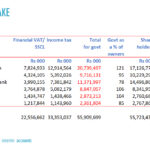
Moody’s cuts America’s pristine credit rating, citing rising debt
- CNL Reporter
- May 17, 2025
- News
- Moody
- 0 Comments
Moody’s downgraded the U.S. sovereign credit rating on Friday due to concerns about the nation’s growing, $36 trillion debt pile, in a move that could complicate President Donald Trump’s efforts to cut taxes and send ripples through global markets.
Moody’s first gave the United States its pristine “Aaa” rating in 1919 and is the last of the three major credit agencies to downgrade it.
Friday’s cut by one notch to “Aa1” follows a change in 2023 in the agency’s outlook on the sovereign due to wider fiscal deficits and higher interest payments.
“Successive US administrations and Congress have failed to agree on measures to reverse the trend of large annual fiscal deficits and growing interest costs,” Moody’s said on Friday, as it changed its outlook on the U.S. to “stable” from “negative.”
The announcement drew criticism from people close to Trump.
Stephen Moore, former senior economic advisor to Trump and an economist at Heritage Foundation, called the move “outrageous”. “If a US backed government bond isn’t triple A-asset then what is?” he told Reuters.
White House communications director Steven Cheung reacted to the downgrade via a social media post, singling out Moody’s economist, Mark Zandi, for criticism. He called Zandi a political opponent of Trump.
Zandi declined to comment. Zandi is the chief economist at Moody’s Analytics, which is a separate entity from the credit ratings agency Moody’s.
Since his return to the White House on January 20, Trump has said he would balance the budget while his Treasury Secretary, Scott Bessent, has repeatedly said the current administration aims to lower U.S. government funding costs.
But the administration’s attempts to raise revenue and cut spending have so far failed to persuade investors.
Trump’s attempts to cut spending through Elon Musk’s Department of Government Efficiency have fallen far short of its initial goals. And attempts to raise revenue through tariffs have sparked concerns about a trade war and global slowdown, roiling markets.
Left unchecked, such worries could trigger a bond market rout and hinder the administration’s ability to pursue its agenda.
The downgrade, which came after market close, sent yields on Treasury bonds higher, and analysts said it could give investors a pause when markets re-open for regular trading on Monday.
“It basically adds to the evidence that the United States has too much debt,” said Darrell Duffie, a Stanford finance professor who was formerly on Moody’s board. “Congress is just going to have to discipline itself, either get more revenues or spend less.”

